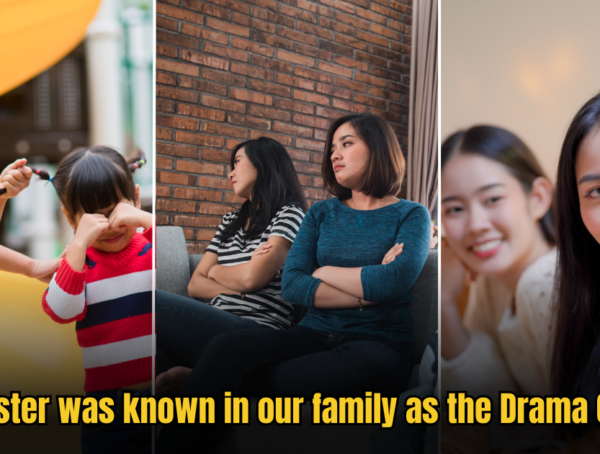
This world is a big scary place.
Adulting is hard. The movies make it look easy. They lie.
But fear not, because that’s the point of school, right?
School is supposed to prepare us for the real world.
But does it?
In Real Life asked everyday Malaysians what they think. Did the Malaysian education system prepare them for the big bad world?
If no, what do they wish they learned in school, but did not?
Of the many answers we received, here are 5 that kept popping up:
1. Critical thinking
The majority of the participants in our survey cited critical thinking as something our education system failed to teach them.
Critical thinking is the ability to take the facts in front of us, analyse them, and then transform them into a judgement.
It is important in problem solving, which is an important skill in the workplace, and also necessary to get through life.
“The education system did not encourage us to think critically,” shared Sara. “The answers were all in the book, and given the focus on the As, it is no wonder that many of us just blindly memorised. And it worked. It got us the As, but how does the As help with our analytical skills?”
Eugene added, “I think critical thinking is very important in being able to sift through the news and separate fact from bullshit. We also need to be able to weigh different opinions and recognise nuance too.”

Picture credit: Hunters Race @ Unsplash
2. Sex education
Most of Malaysia’s sex education boils down to two questions: One, where do babies come from? Two, how do we prevent babies from coming?
But basic biology isn’t enough. What about consent, safe sex, and birth control?
“Two years into my marriage, and I was using a condom wrong,” quipped Carmen. “Nobody told me you’re supposed to pinch the tip before rolling the condom down. Otherwise, the condom might break!”
This study from the University of Washington found that teens who were taught sex education were less likely to get pregnant out of wedlock than teens who were taught abstinence.
That’s because they learnt about the importance of condoms, how to put them on, and other key information that no adult will tell them.
Baby dumping cases in Malaysia are so common, it’s become a basic fact of society. Astro Awani reported that 14 out of every 1,000 underage girls get pregnant every year. That adds up to 18,000 teen pregnancies a year.
Malaysian society collective judges girls who go through teenage pregnancy.
“She’s a bad daughter.”
“This is what happens when you’re lacking faith.”
“She will turn out to be a waste of society.”
But many of these cases are girls who fall victim due to being young, and have been sexually taken advantage of.
They are unable to seek help because of the stigma. With nowhere to turn, they do the unthinkable: dumping the baby.
So the trade off is:
Comprehensive sex education: Teens having sex, but less unwanted babies.
Abstinence sex education: Teens having sex, but more unwanted babies.
Which do you prefer?
3. Mental health
“Back in school, there was a 1-day exhibition on stress management,” reminisced Liza.
“It was in the school hall, near the exam period. As far as I can remember, that was the only time we were taught about mental health.”
In Asia, mental health still isn’t considered a ‘real’ issue.
Liza mentioned how she had a senior manager tell her that depression is something only rich people have time to get.
“He was really disparaging of people who have it. And this man has kids!”
The stigma is real. We need to recognise the signs, to watch out for each other’s mental health.
Awareness is important. Schools need spaces where kids can talk about feelings and emotions in a healthy manner.
A study published by the Malaysian Ministry of Health in 2018 revealed that Malaysian teens aged 13 to 17 are suffering critically from mental health problems.

The same survey showed that 10% of these teenagers had suicidal thoughts.

Here’s the part that doesn’t get talked about often enough: Those depressed Malaysian teenagers eventually become depressed Malaysian adults.
Yes, depression doesn’t magically disappear when you become an adult. People just get better at hiding the symptoms in order to look presentable.
4. Soft skills
“No man is an island,” John Donne once said.
Every job requires communication with the community we serve. We need other people for support and to thrive.
The Khazanah Research Institute published a report on young Malaysians who are transitioning to an office job.
They’d found that employers actually rated soft skills as more important than professional qualifications.
My friend Wilson commented, “The system glorifies paper tests and sidelines soft skills. It’s dehumanising. There are so many other facets of being human apart from exam results. This is why we don’t have empathy in society.”
“We had oral tests and group projects, but they did not add any marks to our final SPM cert,” voiced Carmen.
Without soft skills being measured, how will students learn to work together as a team?

Picture credit: Mimi Thian @ Unsplash
5. Real-life application of knowledge
“What isn’t measured is ignored.”
Sure, we know that the square root of 9 is 3, but how does that actually help us in our day-to-day life?

Remember this? Me neither.
We compile all these seemingly useless facts in our head, yet there is a disconnect between the head knowledge and their practical application.
Vanessa told me, “Geography was a wasted opportunity because we could have connected it with history and geopolitics. It was an opportunity to learn why conflicts between countries and regions happen.”
“Science and maths, especially, could directly be applied to real life. For example, there is a correlation between hot weather and lack of trees, traffic jams and the number of people in each private vehicle, and rate of inflation on school canteen food prices.”
“Instead of Pendidikan Moral, we could have had cultural studies which correlate with history. That would give us a chance to learn how events from our past, like the British and Japanese occupation, have shaped us.”
“These could be further tied to how western advertising and media has influenced us in Malaysia.”
“That’s not the end of it. There’s financial literacy from accounts. Health literacy from Pendidikan Jasmani. Our syllabus has so much potential!”
Our education system is long overdue for a revamp
Everyone agrees that our education system requires a revamp. Here are some ways to improve it:
1 ) Project-based learning
“We need more project-based learning,” observed Ignatius. “For example, we could teach students how to plan an event or launch a project. The sky’s the limit.”
Carmen agreed, “That’s true. Right now, we have only co-curriculum activities. Everybody is supposed to participate, but only a handful of students end up running the show.”
Project-based learning teaches critical thinking, independence, communication skills, and resourcefulness.
Besides, when a large percentage of the score comes from these projects, there is less pressure to perform one-off during exams.
The problem with project-based learning is that it’s harder to grade than exams.

Picture credit: Headway @ Unsplash
2) Sexual health & mental health lessons in schools
Liza expressed, “Incorporate mental and sexual health education into the school syllabus, but leave religion and morals out of it.”
If the lessons are tied to religion or have a ‘moral agenda’ behind it, this might land the kid in an undesirable psychological state.
For example, teaching that having sex is a sin, will make a kid feel ashamed for touching their own bodies. They will be less likely to reach out to authority figures for advice, worried about judgement.
Especially if the kid already has mental health struggles, or has been sexually abused.
School counselors and nurses should be trained to handle mental health queries without judgement.
They should only direct the children to the correct resources when necessary. Such services should be made known to children directly. The children should feel safe approaching these trained professionals.
3) Engage the help of the private sector
Joh Anne quipped, “We already have PPP (Public Private Partnership) and that’s great. There are many private firms currently contributing, but there’s room for so much more.”
“Alliance bank has an initiative that teaches school kids financial literacy. Nestle teaches rural kids to eat healthy.”
“But each company can only contribute that much, so we need more private firms to participate.”

Aeiou challenge season 6
Credit: www.alliancebank.com.my
Nelly added, “After Form 5, I did my A-levels overseas. For our Civic lesson, we invited a jazz band. We listened to them and identified when a solo happened. We were then taught to applaud at the right moment to appreciate the soloist’s performance.”
“This knowledge didn’t help us make more money in the future, but it hopefully nurtured a society that will do more than slave and buy and waste.”
“It’ll be great if Malaysia could include something like that in our syllabus.”
4) Allow more vocational studies without stigma
We can’t grade a fish on climbing a tree, but put the fish in water and wait to watch it shine.
Likewise, not all of us are academically inclined. We each have our personal talents and strengths that deserve to be honed.
Remove the stigma from vocational schools or subjects. Stop seeing vocational studies as alternatives, and start seeing them as viable choices.
“There is no avenue for people to excel in vocational subjects and feel a sense of self-worth and empowerment. Instead, they feel left behind by the education system,” said Vanessa.
“Everyone knows the premier schools, but can anyone name a vocational school that you would aspire to go to?”
“Personally, although I had strong academic results, I truly derive joy from working with my hands, like making clothes for example. However, I had to get a white-collar job because I got good grades.”
“Kemahiran Hidup felt like a wasted opportunity. I made a buzzy thing, and that was it!”
Perhaps, vocational studies have a stigma because blue-collar labour is less valued by our Malaysian society.
Or maybe, the education system shaped our culture.

Picture credit: J Williams @ Unsplash
5) Abolish vernacular school system
Our current system of vernacular schools has gone through heated debates.
But hear me out.
Malaysia is a melting pot of races, cultures and religions. Therefore, it does not serve us to bull through life with a narrow worldview, ignorant of the other communities.
“I have a friend from the Chinese school system. She offered a Muslim friend of ours non-halal meat,” mentioned Eugene. “She didn’t know that meat other than pork can be non-halal.”
This is just one example of how the current vernacular school system segregates us. The results are adults who are completely ignorant of cultures other than their own, and struggle to work with people from different cultural backgrounds.
Research has shown that a diverse workforce leads to varied perspectives, and hence increased creativity and productivity.
To flourish, we have to learn from each other and integrate into one. This starts from childhood, and the vernacular system does not help that.
Author’s thoughts
To be honest, I truly benefited from my time in the government school system. Nonetheless, I must stress that I was loud with thick skin, elbowed my way through school, and gleaned advantage from as many school activities as I could.
I also grew up in Petaling Jaya among the privileged, where our parents could afford books, internet connection, and Astro. This expanded our worldviews, and we in turn fed off each other.
Therefore, I admit that my experience might not be representative of everybody who has been through the national school system. There appears to be a large spectrum, and environment seems to be the key.
Having said that, no matter what our experience has been, we must acknowledge that education directly affects national prosperity.
As such, improving our education system should be a continuous conversation.
For more stories like this, read: I Was Bullied in An SRJK(C) School Because I Was A Banana and Public School Vs. Private School – What Are The Pros And Cons? To get new stories from IRL, follow us on Facebook & Instagram.
Disclaimer: In Real Life is a platform for everyday people to share their experiences and voices. All articles are personal stories and do not necessarily echo In Real Life’s sentiments.
You might also like
More from Real Skills
How I Saved Almost RM50,000 On Buying My First Car
Here's how this Malaysian man with a RM3,500 salary saved RM50,000 on his first car.
Angry M’sian Boss Demands Unpaid Overtime Over Raya, Causes 9 Staff To Quit
An anonymous employee at a local SME shares how a bad-tempered boss eventually caused 9 staff to quit before Hari …
I Studied In Chinese School As A Malay Boy, Here’s What I Learnt
Every time I used Mandarin outside of school, family members would come up to me at gatherings and ask me …


















